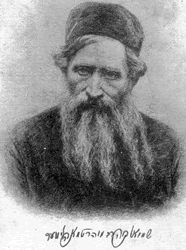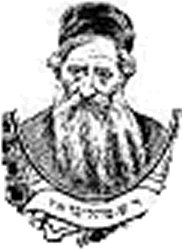

Shmuel Moholiver
From Yahadut Lita volume 3 page 66.
Was born in Glubokie in 1804 (in another source 1824), the son of Yehuda
Leib. Shmuel MOHOLIVER was such a talented boy that by the age of 12
he was already studying at the Volozhin Yeshiva. He could recite complete
chapters of the bible by early age. He was a rabbi in Globokie for six
years starting in 1848. Later he moved to Shaki (14 years), Radam (15
years), and Bialystock (15 years). In 1873 he took part in the meeting
of the Rabbi’s committee in St. Petersburg, were he called all
parts of the Jewish society to unit. When a law was written about compulsory
service in the Russian army he implored the Jews to be respectful of
the law. When pogroms erupted against the Jews of Russia and Rumania
in 1882 he went to Lebub in order to appeal to the immigration committee
to send Jewish refugees to Eretz Israel. He established the first committee
of Hovovei Zion (the Lovers of Zion) in Warsaw in the winter of 1882.
Influenced many of the most famous rabbis to ask Jews to buy land in
Israel (amongst the Rabbis were; Rabbi Eliyahu Chaim Mayzel and Yosef
Dov Selvyechik to call upon all rabbis to establish committees and founds
to buy land in Eretz Israel He traveled to West Europe and met with
Baron Edmond Rothschild who at is influence joined “Chibat Zion”
to buy land in Israel. He traveled all around to implore people to join
and when he arrived to Bialystock he was offered a job as a rabbi. He
agreed as long as they let him continue his other activities for Chibat
Zion. In 1885 Dr. Pinsker asked him to join the Zionist meeting in KatovitzT
he was elected there to the general head committee of the Zionists.
After some complication he started sending the funds he collected directly
to Eretz Israel. After some time the relation between Bialistok Zionists
and Odessa Zionists were mended. In 1890 he was pointed in Odessa at
a Ch”Z meeting as a special honor member of the leaders. When the
meeting concluded he visited Eretz Israel. After his return he wrote
a book “Shivat Zion” (return to Zion). He attempted to sway
Baron Hirsh to join the movement but failed. In 1891 he joined the meeting
in Warsaw, that year was a law point with the settlers of Israel He
organized a meeting in Drosknik where a decision was made to establish
a spiritual center. (Later it became known as “Mizrachi”)
In 1894 the Ch”Z membership decided to establish a place in Israel
by the name of Gan Shmuel in his honor (Today Kibbutz Gan Shmuel). He
sent a congratulatory letter to the first Zionist congress that he could
not attend for his old age. He died in Bialystock in 1898.
“Hamizrachi” published a collection of his assay “ Sefer
Shmuel” for the 25th. Year after his death Published in Jerusalem
by Rabbi Y. L. Fishman in 1923 .
Another collection by him is “Chikrai Halacha veshelot Vetshuvot”
–Published in Jerusalem in 1944.
from the Internet; http://www.jafi.org.il/education/100/people/bios/mohal.html
Rabbi in Poland and one of the founders of religious Zionism. I. His
Life
Born into a rabbinical family
(in Globokie), Vilna region, Samuel Mohilever was also a rabbi. Ordained
in 1842 at the Volozhin yeshiva, he was offered rabbinical posts in
several communities in the Vilna area. In each place, he became active
in community affairs. An early member of the Hovevei Zion in Russia,
he became one of the founders of religious Zionism.
In the 1870s, Mohilever was one of the rabbis who met with leaders of
the maskilim in order to try to bring the two sides together. He was
attracted to the concept and possibilities of settling mass numbers
of Jews in Eretz Yisrael. This desire led to the founding of the Hibbat
Zion.
In 1890, he led a group tour of Eretz Yisrael. In 1893, he initiated
the concept of a "mercaz ruhani" (spiritual center) which
became Mizrachi, the religious Zionist organization.
A member of the Zionist Organization, failing health prevented him from
attending the First Zionist Congress in Basle in 1897. He died the following
year.
His grandson, Josef Mohilever, followed in his grandfathers footsteps.
Having received a traditional Jewish and Zionist education, he was also
active in Zionist groups and was a government-appointed rabbi. He moved
to Palestine in 1920 and settled in Jerusalem where he was deputy head
of the Teacherss' Seminary and then head of the Hebrew High School.
II. His Accomplishments
Rabbi Samuel Mohilever had the proper background for taking stands on
community affairs in eastern Europe in the early 1900s.
On the philosophical side, he worked on cooperating with leaders of
the more modern maskilim movement for the welfare of the Jewish people
as a whole. As pogroms swept through eastern Europe and Russia, he approached
both those who fled to Russia as well as the philanthropists to try
to convince them to encourage Jews to go to Eretz Yisrael. These activities
eventually led to the founding of the Hibbat Zion (love of Zion) movement,
and later to the founding of the Mizrachi movement which joined the
Zionist Organization in 1902. When other religious leaders withdrew
their support of the Hibbat Zion because of their contact with the maskilim,
Mohilever did not join them. He encouraged Pinsker and Lilienblum who
wanted to organize the various local Hovevei Zion groups into one organization.
On the practical side, he was one of the leaders who influenced Edmond
de Rothschild to help establish early settlements in Eretz Yisrael,
particularly Ekron, which was intended for Jewish farmers from Russia.
He also helped persuade Jews in Bialystok to settle Petach Tikva.
In 1883 he became rabbi of Bialystok, where his members granted him
time to continue his public works. He was honorary president of the
1884 Hovevei Zion conference, as well as chairman of their conferences
in 1887 and 1889. Under his influence, a board of rabbis was chosen
to insure that settlement work in Eretz Yisrael would be carried out
in accordance with Jewish tradition as much as possible. He was one
of the rabbinical sources who allowed Jewish farmers to work their land
during the shemitta year. One of the initial speakers of the founding
conference of the Hovevei Zion in Odessa in 1890, he then led a group
tour of Eretz Yisrael. Upon his return, he encouraged financial and
physical support for settlement in Eretz Yisrael. A result of this effort
was his initiative to form a spiritual to direct public relations and
general information activities among Hovevei Zion members. This effort
became Mizrachi, the religious Zionist organization. In recognition
of his efforts, an orchard called Gan Shmuel was planted near Hadera
for his 70th birthday.
Mohilever and his colleagues continued their work, especially among
Orthodox Jews, and as a result, Mizrachi became the foundation of the
religious Zionist movement. In 1902, four years after Mohilever's death,
Mizrachi officially joined the Zionist Organization.
His last letter to the Jews of Russia before his death urged them to
work to achieve a deep attachment to the commandment to settle in Eretz
Yisrael, which he termed "the foundation of the existence of our
people."
http://www.jafi.org.il/education/100/people/bios/mohal.html